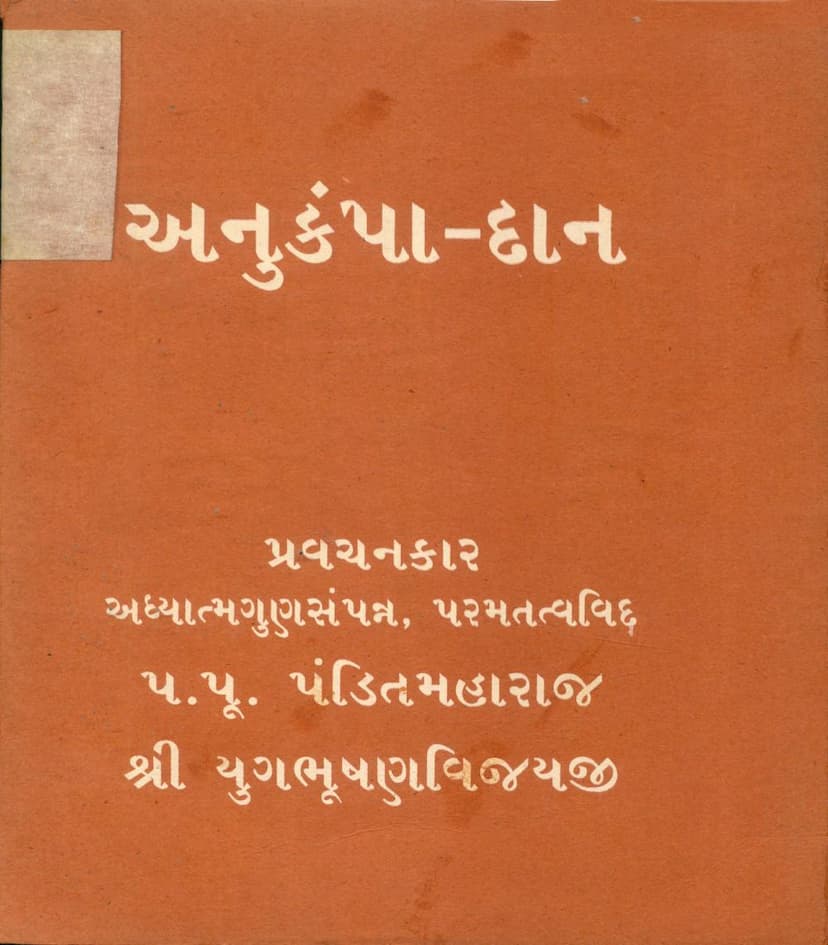Anukampadan
Added to library: September 1, 2025
Loading image...

Summary
This is a summary of the Jain text titled "Anukampadan" by Yugbhushanvijay, based on the provided pages:
The text is a collection of discourses and explanations by the esteemed Jain scholar Pandit Maharaj Shri Yugbhushanvijayji. The central theme revolves around Anukampa Daan (compassionate charity/giving) and related Jain principles.
Here's a breakdown of the key points and concepts discussed in the text:
- The Importance of Daan (Charity): The text emphasizes that among the four types of religious practice (charity, penance, knowledge, and conduct), charity holds a primary position. It is considered the foundation of Dharma and the means to spiritual upliftment.
- Types of Anukampa Daan:
- Abhaydaan (Fearlessness/Protection): Giving the assurance of safety and protection to living beings is considered the highest form of Anukampa Daan. It leads to the cessation of sorrow and suffering.
- Jnana Daan (Knowledge Charity): Imparting true knowledge, especially about the soul and spiritual liberation, is also highly valued. It helps in overcoming the cycle of birth and death.
- Anukampa Daan (General Compassionate Giving): This includes various forms of aid and support to those in need, whether they are living beings in distress or facing hardships.
- The Nature of True Charity: The text clarifies that true charity is not merely giving away material possessions. It is about offering something that belongs to oneself with a willing heart and the right intention. The motivation behind the giving is crucial.
- Self-Ownership: Charity is only possible when the giver has ownership of the item. Giving something that is not yours is not considered true charity.
- Intention: The intention behind giving is paramount. Charity given with a desire for reward or recognition diminishes its spiritual value.
- Purity and Sacrifice: True charity involves a sense of sacrifice and detachment from the belongings being given.
- Distinction between Anukampa and Supatra Daan: While both are important, the text draws distinctions. Anukampa Daan is often directed towards those in need or distress, while Supatra Daan is given to worthy recipients, particularly those on the spiritual path (like monks and nuns). The text suggests that giving to the worthy (Supatra) has its own significance, but Anukampa Daan is essential for alleviating suffering.
- The Role of Intention and Bhavana (Internal State): The discussions frequently highlight the internal state of the giver. A pure intention, selflessness, and compassion are emphasized over the material value of the gift.
- The Impact of Actions: The text delves into the law of karma, explaining how our actions, intentions, and even thoughts have consequences. Giving with the right attitude leads to positive karmic results, while selfish or impure intentions can negate the benefits.
- Addressing Misconceptions: The discourses address common misconceptions about charity, such as:
- Giving out of obligation or for show is not true charity.
- The idea that giving leads to depletion is a misconception; true giving can lead to spiritual abundance.
- The emphasis is not solely on material giving but also on giving with compassion and understanding.
- Ethical Conduct and Right Action: The text stresses the importance of ethical conduct in all actions, including charity. It guides the listener on how to discern right action from wrong, emphasizing the role of viveka (discretion) and compassion.
- The True Spirit of Jainism: The core message is to live a life of compassion, detachment, and righteousness. The teachings encourage introspection and self-awareness to cultivate these qualities.
- The Importance of Right Knowledge (Samyak Darshan): The discourses highlight that true understanding and right faith are essential for practicing charity correctly and for spiritual progress. Misguided charity or charity performed with wrong intentions can be detrimental.
- The Role of Saints and Gurus: The discourse implicitly acknowledges the role of spiritual guides and masters (like Pujya Gurudev) in elucidating these profound spiritual principles.
In essence, "Anukampadan" is a comprehensive exposition on the essence and practice of compassionate giving within the Jain philosophy, urging followers to cultivate genuine empathy, selflessness, and right intention in their charitable endeavors for spiritual growth and universal well-being.